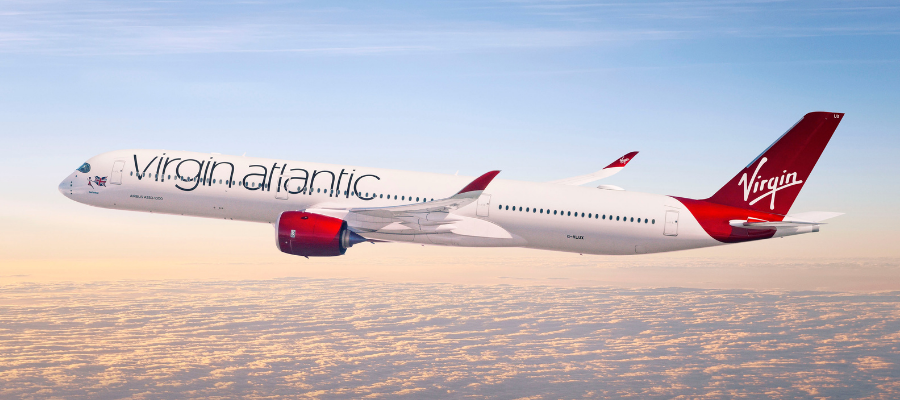🕒 Article read time: 2 minutes
Virgin Atlantic launches first ‘eco’ flight from Heathrow to Florida

Fuelled by fast-burning, high-emitting kerosene, aviation is often seen as the most challenging mode of transport to decarbonise, but one trans-Atlantic carrier thinks it may have the answer.
Founded by flamboyant serial entrepreneur Richard Branson in 1984, Virgin Atlantic has never shied away from publicity, and its latest announcement is characteristically eye catching. Last week (1 November 2022), the airline launched its first direct flight between London and Florida using what it described as “the greenest plane in the skies”. It departed from Heathrow Airport at 8am and arrived ten hours later in Tampa at 2pm EST.
The aircraft used – an Airbus A330neo dubbed Billie Holiday – is described as “one of the quietest and most fuel efficient in the sky.” It is the newest aircraft in the Virgin fleet, succeeding the A330-300, but the planes are 11 per cent more fuel and carbon efficient than their predecessor. It also offers a 50 per cent reduction in airport noise contour.
PAVING THE WAY TO GUILT-FREE FLIGHT
Virgin says it expects to add three more of the A330neo planes this year, with a total of 16 in use by 2026. Shai Weiss, Chief Executive of Virgin Atlantic, said the A330neo planes paved the way to “guilt-free travel”.
“The number one thing airlines need to do is fly the youngest fleet in the sky,” Weiss said in a statement.
“Over the last decade, we have reduced our carbon emissions by 36 per cent, despite flying six per cent more. We are calling on other airlines to do exactly the same – invest, and have the youngest fleet in the sky,” he said.
The Virgin fleet of planes is seven years old on average, which the airline said is almost half that of its closest competitors which have fleets of aircraft that average 13 years. “We are all on the road to net-zero flying by 2050,” Weiss said.
SUSTAINABLE AVIATION FUELS
Virgin is also working towards expanding its sustainable aviation fuel (SAF). It recently invested in Air Company, a fuel producer which helped develop Airmade, the first carbon-neutral jet fuel made from captured CO2.
Most SAF is made from feedstocks that could be used for other purposes, such as feeding people and animals.
Air Company doesn’t require anything but emissions for its SAF; it traps carbon dioxide from factories turning corn into ethanol for conventional fuel. The practice is emissions-heavy and Air Company says the CO2 it produces is “pure”.
And if ethanol production runs dry as consumers shift to EVs and other sustainable modes of transport, there is still an abundant source of CO2 available to turn into fuel.
INVESTING IN THE NEXT GENERATION OF FLIGHT
Virgin first used the A330neo aircraft last month on its route between Heathrow and Boston. It will take delivery of three of the aircraft this year and plans to have 16 in use by 2026.
Alexandra Herdman, Senior Policy Manager, Logistics UK, said: “Aviation is a notoriously difficult nut to crack when it comes to decarbonising freight. However, Virgin Atlantic’s planned investment in the next generation of planes is testament to its commitment to operating the cleanest fleet of aircraft currently available. The 11 per cent saving in fuel and carbon efficiency is significant, as is the impressive 50 per cent reduction in airport noise. This shows how the path to decarbonising flight – and therefore air cargo – is both possible and ultimately achievable.”
*www.logistics.org.uk/air
Published On: 10/11/2022 16:00:29

Comments Section
If you are a Logistics UK member login to add comments.